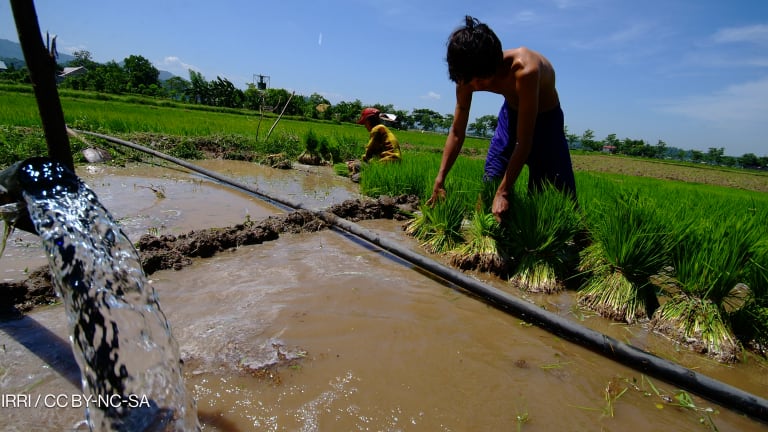
COVID-19, climate change, and corruption: These are among the WASH sector’s biggest challenges. But rather than dwelling on their impact, attendees at this year’s World Water Week said the event brought a focus on action.
“We’ve just seen the latest Intergovernmental Panel on Climate Change report and the latest Joint Monitoring Program figures [which] show we really need to get moving on the Sustainable Development Goals,” said Claire Grandadam, communications coordinator at Water Integrity Network. “It could have been tense or hard at World Water Week but the tone is action-oriented. That’s heartening,” she told Devex.
Now in its 30th year, the five-day global gathering — hosted by the Stockholm International Water Institute — is often regarded as the biggest annual WASH event, focusing on addressing the world’s biggest water challenges. The primary theme for 2021, having topped conversations at last year’s World Water Week, was “building resilience faster.”
4 ways to make WASH projects climate resilient
How do you ensure WASH projects can withstand extreme weather events? Devex speaks to water and sanitation experts to find out.
Stefan Uhlenbrook, program director at CGIAR’s research program on water, land, and ecosystems, said achieving resilience faster “is critical to respond to the challenge of climate change, to minimize effects of current possible future pandemics, and to develop more sustainable pathways.”
Thousands of professionals signed up to discuss this and other topics at the virtual event. Here are three key takeaways:
1. Building resilience faster means adopting different approaches
While Uhlenbrook highlighted the need to move “from a water-centric view to a multi-centric approach across scales” by cooperating with other sectors, a big emphasis throughout the week was put on adopting nature-based solutions and Indigenous knowledge.
Increasingly, nature is being looked at as a solution to the different water challenges, Vishwa Ranjan Sinha, program officer of water and wetlands in South Asia at the International Union for Conservation of Nature, told a panel. “And, in this discourse, Indigenous people are at the center,” he said, adding that such knowledge promotes sustainability.
“I'm leaving this conference with the impression that sustainable water systems are inextricably linked with building resilient societies,” Lauren Cuscuna, innovations and insights manager at Safe Water Network, told Devex. “Resiliency lies within developing strong communities, working congruously with the environment, and collaborating with governments to create an enabling environment.”
Attendees recommended working with Indigenous communities to learn from their methods of conserving and protecting natural resources, while other panels focused on creating road maps for rethinking urban sanitation, taking a business approach to sanitation in health care, and ensuring inclusive and equitable water management.
2. There’s a communication issue
“At this amazing turning point in human history, we have all the means to solve the big water problems and now it’s just a matter of the public learning about them and putting pressure on the politicians,” John Cherry, a groundwater expert, and 2020 Stockholm Water Prize laureate told attendees. But that’s easier said than done.
Numerous sessions looked at the issue of communicating around some of the biggest WASH challenges and the problems involved in having those messages resonate enough, both within and outside of the development sector, to ignite substantial impact and change.
In the opening plenary, Sandra Postel, founder of the Global Water Policy Project and 2021’s Stockholm Water Prize laureate, asked moderator and The Economist journalist Alok Jha what he considers the most effective ways of raising awareness among the broader public.
His advice was to make the issue about the targeted audience and empower people with knowledge so they can make decisions rather than making them feel bad. “Bringing people along with you is the art of general persuasion and gentle communication,” he added.
For example, One Drop Foundation uses art to “trigger emotions, action, and ultimately sustainable change.” During the week, Jean-Louis Dufresne, CEO at One Drop Foundation, said “the necessity to integrate local culture and social arts in projects as catalyzers of sustainable change, to prioritize co-creation processes and human-centered solutions and to carry out systemic processes that include local and global actors” was discussed.
In terms of communicating within the sector, Lesley Pories, sector strategy manager at Water.org, told Devex that climate resilience and action have helped to connect and build communication between distinct areas such as WASH and water resource management.
“It’s not perfect by any means, but the lines of communication are much more open now and the willingness to collaborate is crystal clear,” she said. Climate change has forced water professionals to “look hard, together, at how we talk about our work to each other and the external stakeholders we want to engage,” she added.
“Resiliency lies within developing strong communities, working congruously with the environment, and collaborating with governments to create an enabling environment.”
— Lauren Cuscuna, innovations and insights manager, Safe Water Network3. Tackling corruption and citywide sanitation
While the issues of climate change and COVID-19 shine a bright light on the need to better bolster WASH systems, one issue that’s less visible is the way in which corruption is undermining any citywide efforts to do so.
During the week, WIN released its “Water Integrity Global Outlook 2021: Urban Water and Sanitation” report, which states that between 4% and 26% of total WASH expenditure is lost to corruption on a yearly basis. Unless this and other integrity failures — sextortion, mismanagement of WASH project funding, and inflated water prices — are tackled at a city level, the report says progress toward SDG 6 may be thwarted.
Grandadam, however, said she was impressed by how often issues of transparency and accountability — in practical terms, for the work of utilities, regulators, and water organizations — came up in various sessions.
Other challenges for certain cities include rapid urbanization, a lack of infrastructure, and climate change’s strain on existing resources. According to the World Bank, 57% of those living in urban areas currently lack access to toilets with a full sanitation service and 16% don’t have accessible basic sanitation services.
But Sam Drabble, the head of evaluation, research, and learning at Water & Sanitation for the Urban Poor, said the week had brought home that the citywide inclusive sanitation agenda — which aims to ensure everyone has access to safely managed sanitation through a variety of solutions — is “real, tangible, and gaining momentum.”
“We left the discussions more passionate than ever at the potential of CWIS, and our ability to contribute to this global push to achieve greater impact,” he told Devex.
Visit the WASH Works series for more coverage on water, sanitation, and hygiene — and importantly, how WASH efforts intersect with other development challenges. You can join the conversation using the hashtag #WASHWorks.









